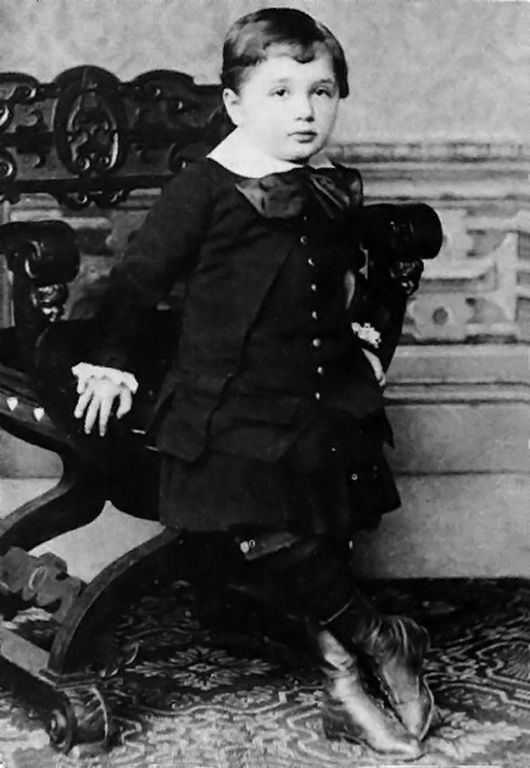
From an early Age of Five –
Albert Einstein was a Slow Learner in School

• It is hard to believe how one of the biggest names in the world of science found it difficult to learn and speak but went on to become one of the best we known sit the world has ever known.
• His contributions for science make him one of the most renowned figure in history in this post, we explore the problems Einstein faced during his childhood.
• Born in Ulm, in the German Kingdome on 14 March 1879. Albert Einstein would born in a middle-class family – his father was a salesman and an engineer by profession.
• Albert Einstein took admission and Cass Lake elementary school when he was just five years old. From an early age. Einstein was a slow learner. He took a long time to learn how to speak, which bothered his parents enforce them to consult a doctor.
• He was a below average student in school. Most of his headmasters and teachers always complain about his academic performance.
• But what made him so special was his ability to ask difficult to answer questions from the teachers. He always challenged conventional wisdom in looked at things from a different perspective.
• His father new about his outstanding capabilities and gave him a compass at the age of five. He used that compass to explore the magnetic field.
• Einstein's father wanted to see his son as an electrical engineer, but Einstein had different plans for his future. He refuse his father when he asked him to take admission in electrical engineering and presented on the educational method of the Institute.
• Einstein was affected by the low drive to emphasize which lead to autism at a young age. By the time he was a teenager, he got over these problems and started to live like a normal person.
• At the age of 12, Einstein started to solve complex mathematical and arithmetic problems. When he was 15 years old, he gain full command over differentiation and integration.
• He used to solve mathematics problems throughout summer vacation because he allowed mathematics.
Albert Einstein’s Inferiority Complex
• My speech, demeanor, and confidence shattered during the actual engagement, leaving me feeling confused and insignificant at the demise of our conversation. The topics at hand could be as simple as, “I will be out of town x amount of days” to as difficult as putting in my two-week’s notice.
• Battling with anxiety from a young age, I found it very difficult to even carry conversations with people I knew intimately. However, the fear of speaking with those above me in a sense created an inferiority complex that I did not understand until recently.
• In fact, I once worked for a company where my direct manager was extremely cold and demeaning. I was constantly on edge; even afraid to speak to her about seemingly small matters as I was overwhelmingly uncomfortable when she entered the room.
• I was qualified for the position and I seemed to have all of the tools capable of winning. I allowed my anxiety to overshadow my abilities which ultimately led to a messy resignation. Needless to say, I needed a major confidence boost.
• I noticed that this was a growing pattern with not only my secular managers, but I even experienced this around individuals who I deemed better than myself. Unfortunately, I missed many opportunities to truly showcase my personality.
• These experiences paired with my observations of human behavior led me to further analyze this topic in order to hopefully help someone else in the midst of this issue.
What is Authority?
• The definition of authority can be relative; much like my theory that everything in life is relative.
• Some may consider their parents a figure of authority but not those in governmental positions. This blurry line of authoritativeness can be cleared up by one word: respect.
• It is human nature to govern who is important and who is not based upon personal vendetta’s created by the individual them self. For example, a child may love and adore his father, thus categorizing him in a positive light of authority.
• As that child grows older, he may see how those in political power operate thus deciding that those individuals do not deserve his respect. –
• Set aside Einstein genius – our biographical characters are pretty much the same.
• Anxiety. Simply put, someone can have the title of able to delegate rules, but that does not mean those under him have to respect that person actions.
• Without that respect, there is no room for disappointment simply because the desire to live up to a certain expectation is absent. So if a person does not respect you, they do not view you as someone authoritatively over them. Thus there is no anxiety to be experienced.
• But what if you were a child who never developed their own worldview properly? This child is introverted by nature and cannot make a decision without approval due to his parents or guardians excessive control in his life.
• He grows up feeling that everyone is above him and everyone deserves the same amount of respect. He is overly polite, extending himself far beyond measure so as not to “offend” anyone.
• As he enters the workforce, this mentality is compounded, leaving it difficult for him to even speak to his boss naturally without feeling on guard. These overwhelming feelings of anxiousness can distract him from doing his best work.
DLJ
